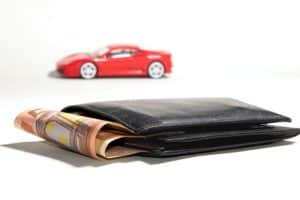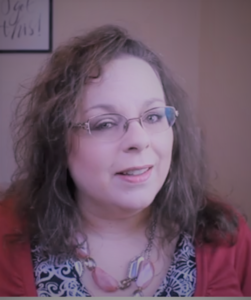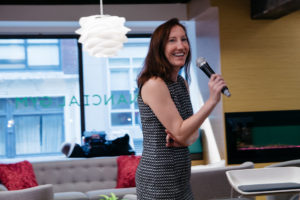Denis O’Brien [0:37]
Welcome to Episode 197. Our car financing decision. Hey money clan, a warm welcome to the Chain of Wealth podcast. I’m your host, Denis O’Brien.
Katie Welsh [0:49]
And I’m Katie Welsh.
Denis O’Brien [0:50]
Alright Kate. So today’s episode is going to be all about a decision, which we have to make. And I’d like to have a decision in order by the end of this episode. So I’m going to spring one on you today.
Katie Welsh [1:3]
Well, I got a little bit of a clue from the title of this show.
Denis O’Brien [1:10]
Yeah, so.
Katie Welsh [1:10]
Glad we’re talking about this here and now.
Denis O’Brien [1:14]
Yeah, for sure. So, to give you guys a bit of information, so we bought a car last year in September.
Katie Welsh [1:20]
Yeah.
Denis O’Brien [1:21]
Yeah, we bought a car last year in September, it was a 2012 VW.
Katie Welsh [1:26]
Its amazing, we love her.
Denis O’Brien [1:28]
Yeah, we really enjoy driving the car. And we paid about 12 grand for it. So we financed the entire thing. We didn’t put any money down. The interest rate at that point was pretty high at 6.69%. So it’s carrying a bit of an interest rate. But at the time, we needed a run around vehicle. And you know, that’s basically the call that we call it the point. We obviously had a lot of other things that we’re busy with. So yeah, we’ll be chatting a little bit about that today. So yeah, right before we dive into today’s episode, if you guys haven’t already, don’t forget to join our Facebook community. You can join us at chainofwealth.com/group. That’s chainofwealth.com/group. Alright, Kate you ready to dive on in?
Katie Welsh [2:10]
Um, I guess so.
Denis O’Brien [2:42]
Alright let’s do it.
Voice Over [2:15]
Welcome to Chain of Wealth, here’s your host, Denis inspiring you to begin your journey of financial freedom.
Denis O’Brien [2:28]
Alright Kate, So today I want to chat to you about the car. So as you are well aware we of a car loan, and I am sick and tired of paying interest.
Katie Welsh [3:10]
Okay.
Denis O’Brien [2:42]
So what I’m proposing is that we do a bulk payment, and we pay the rest of the value of a car off. Why are you looking at me as though I’m crazy?
Katie Welsh [2:55]
Okay. Well, because we had not talked about this at all. But um, so we just got done paying off. We just got done paying for the wedding.
Denis O’Brien [3:6]
Mm hmm.
Katie Welsh [3:7]
We’re saving for a house.
Denis O’Brien [3:9]
Yep.
Katie Welsh [3:10]
And if the last time I checked the loan and I know, before, but can we just back up for a minute?
Denis O’Brien [3:46]
Yeah.
Katie Welsh [3:18]
I know, we have said in prior episodes that we are debt free. And I guess 100%. This, the car loan was is debt.
Denis O’Brien [3:31]
Yeah, it is.
Katie Welsh [3:32]
But to be honest with you, when I was coming off the mountain of $200,000 worth of debt. A little like $10,000 loan for my car, didn’t really feel like debt.
Denis O’Brien [3:45]
Right, So
Katie Welsh [3:46]
I felt debt free, like the car payment is like $300 a month. And when
Denis O’Brien [3:52]
And you’re financing it over three years, you took the smallest amount of financing.
Katie Welsh [3:56]
Right. So when I was coming off of my mountain of debt, this didn’t really seem like anything.
Denis O’Brien [4:3]
Yeah, but
Katie Welsh [4:4]
To be perfectly honest.
Denis O’Brien [4:5]
I gotta tell you something.
Katie Welsh [4:7]
It is something though.
Denis O’Brien [4:8]
it’s still debt yeah.
Katie Welsh [4:9]
Yeah. So. Okay.
Denis O’Brien [4:13]
Alright. So I want to make a bulk payment for the rest of the value in the car. And there is a really good reason for this. So
Katie Welsh [4:22]
All right, Den. So I know what you’re going to say.
Denis O’Brien [4:55]
What’s that?
Katie Welsh [4:27]
That you are tired of paying the interest on it.
Denis O’Brien [4:30]
Yeah, it feels like we’ve had this conversation before doesn’t it.
Katie Welsh [5:2]
Yes. I am a bit hesitant.
Denis O’Brien [4:37]
Okay.
Katie Welsh [5:7]
And I am hesitant, because I am the one who is driving the car most because I need the car to get to and from work right. That’s why we got the car. That is why we got the car. I don’t know how to tell you this. So I’m just going to tell it to you.
Denis O’Brien [5:22]
Alright.
Katie Welsh [4:55]
Traffic around here is horrific. And the drivers are really unforgiving.
Denis O’Brien [5:2]
What does this have to do with paying off a car?
Katie Welsh [5:7]
I get into an almost car accident every day.
Denis O’Brien [5:11]
Kate. You,
Katie Welsh [5:13]
I know I’m being 100% for real.
Denis O’Brien [5:15]
You can’t talk like that.
Katie Welsh [5:17]
Why not?
Denis O’Brien [5:18]
Because that’s like wishing bad luck upon yourself.
Katie Welsh [5:20]
No its.
Denis O’Brien [5:21]
You can’t say you almost get involved in an accident everyday!
Katie Welsh [5:22]
No, it’s being very aware. And I try really hard to be a safe driver. I, you know two hands on the wheel. I pay attention all the time.
Denis O’Brien [6:1]
Indicate when you change lanes.
Katie Welsh [5:33]
I use my blinker when I change lanes.
Denis O’Brien [5:35]
Every time?
Katie Welsh [5:36]
Most of the time. I drive the speed limit. But people in Northern Virginia are really aggressive. And so I’m saying this because to pay off the rest of the car, which is about seven grand.
Denis O’Brien [5:53]
Yeah, I think eight.
Katie Welsh [5:54]
Okay. That it is like that’s a chunk of money.
Denis O’Brien [5:58]
It’s a lot of money.
Katie Welsh [5:59]
That’s a chunk of money.
Denis O’Brien [6:0]
Yeah.
Katie Welsh [6:1]
My nervousness is if I if we pay off the car,
Denis O’Brien [6:6]
yeah.
Katie Welsh [6:8]
Then I could possibly get rear ended, or get into a little bit of a fender bender. And that, that, just seems like now we’re going to be starting right back from where we were.
Denis O’Brien [6:24]
But Kate, we could get involved in an accident, as things are now. Why’s it any different if the car’s paid off?
Katie Welsh [6:33]
I don’t know.
Denis O’Brien [6:35]
It’s no different, you know?
Katie Welsh [6:37]
No, but it is different.
Denis O’Brien [7:7]
Why?
Katie Welsh [6:39]
Because then you have finally hit that threshold where you don’t have a car payment anymore. And now I’ve broken it.
Denis O’Brien [6:47]
Well, just because you don’t have a car payment, doesn’t mean you’re not paying insurance.
Katie Welsh [6:52]
Right.
Denis O’Brien [6:52]
And insurance covers you in the event of loss or damage. So if you had an existing car loan, and you were involved in a bad accident and the car got written off, they would pay you out. But guess what?
Katie Welsh [7:7]
What?
Denis O’Brien [7:7]
You still owe that loan. No, that’s not necessarily negative equity.
Katie Welsh [7:13]
If you total a car or something and
Denis O’Brien [7:17]
Negative equity is like when you carry over a balance, right. So that doesn’t necessarily have to happen.
Katie Welsh [7:23]
You explained it better but I knew that’s what it meant.
Denis O’Brien [7:25]
Yeah, so you don’t necessarily have to carry over balance when you get that insurance payout but that insurance payout needs to go towards your loan, first and foremost. And if there’s any value left over, you then get paid that out. However, if your car is paid off, and you get that insurance payout, you don’t have any car loan, so that money that they pay you goes directly into your pocket, and you can put that towards your next car. So effectively you get ahead of the financing side of the car, and you then are not paying interest on that money that you’ve borrowed. So long story short, we still have these car payments to make right.
Katie Welsh [8:6]
Right.
Denis O’Brien [8:7]
And I did a quick sum over here,
Katie Welsh [8:10]
Of course you did.
Denis O’Brien [8:11]
We’re set to still pay another like $550 worth of interest over the next two years of the remaining value of this car loan.
Katie Welsh [8:19]
Okay.
Denis O’Brien [8:20]
Which is a lot of money.
Katie Welsh [8:21]
It’s a fair amount of money.
Denis O’Brien [8:23]
Yeah, I mean, considering you just paying that to someone, for the sake of you know, them giving you a loan? ‘Cause that’s effectively all interest is that, you know, you’re paying for the opportunity cost of you not putting the money up front.
Katie Welsh [8:34]
Okay.
Denis O’Brien [9:4]
But the thing is, that’s a lot of money in relation to how much value we have in the car, you know, so what I’m proposing is rather we make a big payment, and get rid of this monthly charge and get rid of this interest that we would have paid because we’re gonna have to pay the principal either way. That way we get in front of the loan, and we don’t have a car payment anymore.
Katie Welsh [9:0]
Okay. You should have gone to school to be a lawyer.
Denis O’Brien [9:4]
Why do you say that?
Katie Welsh [9:5]
Because I just feel like all of my objections are just weaselling right down?
Denis O’Brien [9:12]
No, wait, hold on. So why why do you have objections? And what are they?
Katie Welsh [9:15]
Okay. Well, my first objection is, we have a joint bank account. But we also have our own separate accounts,
Denis O’Brien [9:24]
Right.
Katie Welsh [9:25]
Now I don’t know what your separate account looks like. But I don’t have 8 grand just hanging out in mine. So, where’s this money going to come from?
Denis O’Brien [9:33]
Well, we have quite a bit of money in the joint account. And we both get paid this month twice.
Katie Welsh [10:9]
Okay,
Denis O’Brien [10:9]
So we can scrounge around enough money and we had one or two, you know, bits of extra cash this month from the wedding. So we could put together that money and effectively pay off the balance in the car loan and we will cut a pretty fine, you know, we would really would dwindle our savings. However, we do still have money in our Robinhood accounts. And you know, if we do need cash, we can just sell stocks and then liquidate those.
Katie Welsh [10:9]
So I have so many buts going on in my head right now.
Denis O’Brien [10:15]
So then tell me.
Katie Welsh [10:17]
I, I need to organize them for a minute.
Denis O’Brien [10:19]
Yeah.
Katie Welsh [10:20]
So okay. Let’s say we pay off the car, which I’m not an objection to, it’s just spending big chunks of money like this,
Denis O’Brien [10:32]
Right.
Katie Welsh [10:34]
Unexpectedly. And voluntarily.
Denis O’Brien [10:40]
Yeah.
Katie Welsh [10:41]
Make me a little bit hesitant. So I haven’t really had any time to grapple with this. What if we pay off the car, like you said, we can kind of gather our pays and everything. And we have some of our reserve money or, or our emergency money that we can use
Denis O’Brien [11:4]
Right.
Katie Welsh [11:4]
And then I get it, like, the payments that we’re not having to make in future months will replenish our emergency savings. But what if we get like a flat tire or, you know, something, we need some kind of maintenance with the car, in the meantime.
Denis O’Brien [11:23]
Well, we have money left over, you know, like, we still have money in our, in our Robinhood accounts. And this also is just one page for the month, and we do still get paid another the time this month. And while we’re not getting paid 8 grand in a single paycheck, you know, we do still
Katie Welsh [11:40]
But wouldn’t that be nice.
Denis O’Brien [11:42]
And we do still have money, like that’s, you know, would be available to us if we if we needed to get it. And you know, the thing is Kate, like, how much car payment right now, I want to say it’s 365 a month,
Katie Welsh [11:58]
Something like that.
Denis O’Brien [11:59]
Yeah. So I mean, realistically, if you think about it, we’re going to have, you know, an extra $365 a month after this point to invest in whatever we want.
Katie Welsh [12:12]
Right?
Denis O’Brien [12:13]
You know, and I really think that, you know, if we really take that money, and we were to say, alright, well, let’s see what we can actually do with it, you know,
Katie Welsh [13:22]
Now while Denis is talking, I’m just trying to let anybody listening know, he is formulating something in Excel. So go ahead, tell me what you just did.
Denis O’Brien [12:34]
Okay, what I did is I said, let’s take our car payment, which is $365 a month. Okay. Let’s say we were to invest that money, this future money right.
Katie Welsh [12:44]
Okay.
Denis O’Brien [12:45]
And let’s say it has an interest rate of 8% per annum, which is maybe what you get if you invest in the S&P 500.
Katie Welsh [13:21]
Okay,
Denis O’Brien [13:22]
Which kind of like average long term trend,
Katie Welsh [13:23]
Right.
Denis O’Brien [12:55]
And let’s say we take that money, and we do this for 30 years, 30 years, we got $365 going into this account each month.
Katie Welsh [13:4]
Okay,
Denis O’Brien [13:4]
Right. So, after 30 years,
Katie Welsh [13:8]
When we’re 61,
Denis O’Brien [13:9]
When we’re 61, that money will be worth $543,000.
Katie Welsh [13:15]
Just that money,
Denis O’Brien [13:16]
Just that money.
Katie Welsh [13:18]
But we’re gonna have another car payment one day?
Denis O’Brien [13:21]
Not necessarily.
Katie Welsh [13:22]
Why?
Denis O’Brien [13:23]
Because if we stay on the front side of this and keep, you know, funding, you know, and you don’t end up paying this interest, you’re on the better side of it, you know the, the alternative is saying, Well, what happened if you always had the $365 a month that you were paying?
Katie Welsh [13:40]
Go ahead,
Denis O’Brien [13:41]
You know, and this $365 a month. If you did that over 30 years, I’m just going to have to do the math over here. But if you just calculated the interest that you would pay over that period of time, and you’d say, all right, well, it’s for 30, 30 years, you have all these payments and everything else, how much would you actually end up with? After 30 years of payments and everything else? Where did you get to? And how much interest would you actually end up paying? Now, let’s assume that your 365 bucks is on an average car loan of what? Give me an amount that we financed like maybe
$12,000. Alright, so let’s say it’s $12,000. And that you’re going to be basically paying that each and every month. for the foreseeable future and let’s say, the second your car is paid for, you decide that you want to get new car, and you’re going to spend an additional $20,000 at that point, because you’re not paid off your car. The question is, how much is the cost of that going to be over a very long period of time? And, Kate, I’m going to tell you right now, it’s going to be a huge number. It’s going to be a monumental number.
Katie Welsh [14:18]
$12,000
Okay.
Denis O’Brien [14:52]
And you know why?
Katie Welsh [14:55]
Because it’s a long time.
Denis O’Brien [14:57]
Yeah. But also, like, the thing is, how much is your interest worth over a very long period of time? Because that’s realistically what you’re talking about you talking about the future value of money. And if you would just have a car for years and years on end, and you financing it. And look, let’s be real, most people are doing this, most people are just paying their car off. And they’re financing it. And eventually that car gets to zero. And then they’re like, Oh, well, my car got zero. Maybe I should buy another $20,000 car. And the whole process starts again, and again, and again. And eventually you get to a point where you have thrown so much money down the drain, that it’s actually quite crazy.
Katie Welsh [16:9]
Those are really big numbers down there.
Denis O’Brien [15:42]
Yeah, that’s some big numbers. But we’ll see how many per square when you 360 periods. So there’s just like, add all this up, we do some quick math. And we will see exactly where we end up at. And I can tell you right now the numbers going to be huge. I’d like you to take a guess.
Katie Welsh [15:59]
The first number that comes to my mind is a million dollars, but I feel like that is too big.
Denis O’Brien [16:3]
Well, it can’t be a million. Because if you were to save it, you’d only get to what, like
Katie Welsh [16:9]
500,000 300,000?
Denis O’Brien [16:13]
Yeah, so
Katie Welsh [16:14]
that’s my guess 300,000.
Denis O’Brien [16:17]
300,000.
Katie Welsh [16:47]
Yes.
Denis O’Brien [16:19]
Let’s see. So wait, firstly, how many calls would you have? That’s a better question. So
Katie Welsh [16:26]
Only like, two, maybe three?
Denis O’Brien [16:58]
Well, it’s actually a lot more than that. you’d actually go through 10 cars, you’d literally get a new car every three years, which, but on our math does make sense. Because we said that we’re financing a car over three years
Katie Welsh [16:40]
That seems excessive if you pay off a car, you don’t turn around and go buy a new one.
Denis O’Brien [16:44]
But you could.
Katie Welsh [16:45]
Well you’re silly if you do.
Denis O’Brien [16:47]
Well, yeah and you’d have a little but you’d have a little value left over in the car. Maybe not. Maybe you like you say maybe you’re a careless driver. And maybe you’re riding off the car every.
Katie Welsh [16:58]
You don’t have to be the careless driver. It’s like everybody else. It’s like dog-eat-dog out there.
Denis O’Brien [17:3]
Yeah,
Katie Welsh [17:3]
Anyway, go ahead.
Denis O’Brien [17:5]
Anyways, say we were to take the interest and only the interest portion and say, Alright, well, for the first month, it’s 80 bucks, then you pay off a little bit at 78, then the next month at 76. Next month 74. And you do that over a long period of time, and you end up the second you finish buying your one car you then by the next car and the next car and the next car, and you’re constantly just paying off these assets. And look, we’re not assuming a scrap value for these cars but lets be real, it’s a car. Scrap values on cars are almost negligible.
Katie Welsh [17:33]
Okay.
Denis O’Brien [18:3]
Anyway, over a period of 30 years, you would have paid over $15,500 of interest on $12,000 worth of car loans.
Katie Welsh [17:47]
Wait say that number again.
Denis O’Brien [17:48]
15,500.
Katie Welsh [17:49]
15,000 Really?
Denis O’Brien [17:52]
Yeah. So you could basically have bought a free car off the interest at that period of time, over that period of time.
Katie Welsh [18:0]
Alright, Den.
Denis O’Brien [18:0]
So wait, hold on, to take that step further. If you were to take that interest. And you would to say, if I took the interest that I paid every month for this car, and I invested that interest. So the first month we invest 80 the next month we invest 78, the next month we invest 76, over the space of 30 years, we would have saved up a total of $65,000 just off the interest that you would have paid. And that’s not one car, Kate that’s six cars.
Katie Welsh [18:3]
You really came to this conversation prepared.
Denis O’Brien [18:33]
Not really I just did that all in Excel. But the thing is that that’s the cost of interest over a very long period of time. It doesn’t seem like much like oh, well, it’s 80 only $80 worth of interest in this pay period. That’s not a lot of money. No, it’s not. The problem is, is that you get sucked in and you don’t over a long period of time and it adds up and
Katie Welsh [18:51]
The power of compounding.
Denis O’Brien [19:50]
It is the compounding and if you’re not receiving money, you’re on the wrong side of compounding. If you’re not earning cash for your money invested. If you’re paying cash, that’s not where you want to be.
Katie Welsh [19:3]
Okay, Den. So cut to the chase, what do you want?
Denis O’Brien [19:5]
I’d like to pay the car off.
Katie Welsh [19:8]
By when?
Denis O’Brien [19:10]
I would say by my birthday, so August 22.
Katie Welsh [19:18]
Okay.
Denis O’Brien [19:18]
Alright. Well, let’s see what we can do.
Katie Welsh [19:50]
We can do it,
Denis O’Brien [19:50]
We will have to report back and
Katie Welsh [19:24]
No you have all your numbers going and you have clearly planned out all of our little pennies.
Denis O’Brien [19:30]
Future cars.
Katie Welsh [20:0]
Yes, so. Okay.
Denis O’Brien [19:34]
Yeah. Well, you know, I think that knowing the power of the cost of money, and how much you’re actually paying for your car loan. It’s not the one car loan that’s the problem. It’s the future car loans after that.
Katie Welsh [19:45]
Okay,
Denis O’Brien [19:45]
You know, and really what you want to do is get that car and keep it for a long period of time.
Katie Welsh [19:50]
Absolutely. We’re going to drive this little thing until it dies.
Denis O’Brien [19:52]
Exactly. Well Kate, this has been a really fun episode. And I think that you know, if you are looking at buying a car, always think about that cost of compounding.
Katie Welsh [20:0]
Yeah, for sure.
Denis O’Brien [20:1]
Cool, guys. We’ll catch you next time on another episode of Chain of Wealth.








